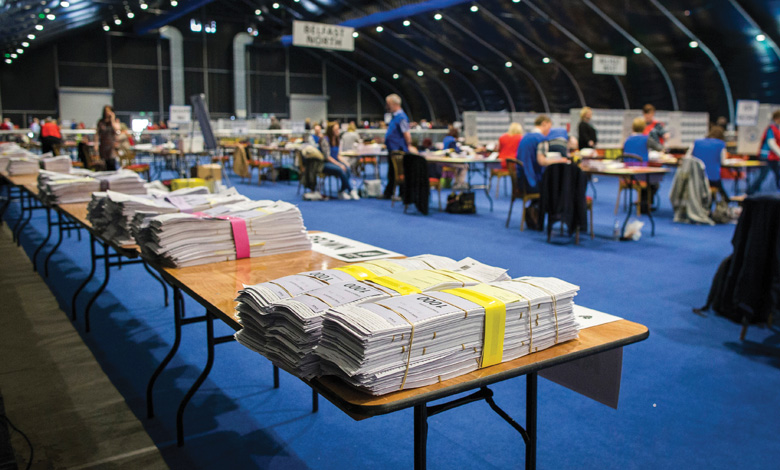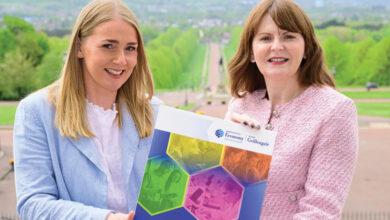Satisfaction with democracy waning north and south

A new Economic and Social Research Institute (ESRI) report into social and political attitudes in Ireland has found that attitudes are typically more positive in the Republic than in Northern Ireland, but that satisfaction with democracy has decreased in each jurisdiction.
Satisfaction with democracy
In its report, Changing social and political attitudes in Ireland and Northern Ireland, the ESRI found satisfaction with democracy was notably lower in Northern Ireland compared to the Republic at the beginning of the 21st century, with data collated showing it to be 22 percentage points lower and under 50 per cent of people expressing satisfaction at the time. This gap was then further widened by further declines in Northern Ireland up to 2002, when the first post-Good Friday Agreement Executive was dissolved, but satisfaction then rose by almost 30 percentage points to 2005/06, counterintuitively at a time when the democratic institutions were not functioning.
Much of this uptick (20 percentage points) was then clawed back by another decrease at the time of the 2008 recession, but from 2009 until 2015, satisfaction with democracy in Northern Ireland “entered a period of slow and sustained recovery, where levels of satisfaction were not too dissimilar” to the Republic. While data limitations mean that the report’s findings on Northern Ireland cease in 2018, it is noted that trends in the two jurisdictions began to diverge once again from 2015 onwards, with northern satisfaction beginning a decline from around 70 per cent to 60 per cent in 2018.
Attitudes in the Republic are said by the ESRI to have been “significantly shaped by the 2008/09 recession and the subsequent period of austerity”. Satisfaction hovered between 70 and 80 per cent in the years between 1998 and 2006, but 2007 saw it dramatically decline by over half, falling from around 80 per cent of people to under 40 per cent expressing satisfaction with democracy. Having slightly recovered to 60 per cent by 2009, satisfaction remained “lower and stable” throughout the period of austerity until 2014, including a dip as low as 50 per cent in 2012/13, and has steadily increased since 2015, with the January-February 2023 level of 83 per cent being the highest recorded over the 25 years studied. Thus, despite its gradual improvement from a low start, the ESRI determines that satisfaction with democracy in Northern Ireland is said to be “much more volatile” than the Republic.
“Optimism for the future, measured by whether or not respondents believe life will improve over the next 12 months, is not high in either jurisdiction.”
Perceived political efficacy, i.e. the degree to which people believe their voice counts, trends largely mirror that of satisfaction with democracy, with Northern Ireland experiencing an increase from 2007 to 2010, a decrease from 2011 to 2014, improvement from 2015 onwards to just over 50 per cent of people believing their voice counts. Having been below 40 per cent in 2007, the proportion of people believing their voice counts in the Republic rose to almost 80 per cent by 2018 but has subsequently decreased, hovering in the 60 per cent range in the 2020s.
Optimism for the future, measured by whether or not respondents believe life will improve over the next 12 months, is not high in either jurisdiction. Having stood at over 40 per cent in Northern Ireland at the start of the century, the rate of people believing life would improve was below 30 per cent by 2018, having risen as high as 50 per cent and dropped as low as 20 per cent in the interim. Having been at a similar level as Northern Ireland in 1998, optimism in the Republic rose as high as 50 per cent during the Celtic Tiger era and then plummeted to 20 per cent during the recession and the years of austerity. Having recovered, fallen, and then recovered again, optimism has once again plummeted since 2021, a period during which the Covid crisis lurched into second and third years and was then compounded by inflationary headwinds.
Trust in institutions
From 1998 to 2023, trust in political institutions never exceeded 50 per cent in either jurisdiction. Political trust was at the same level in both in 1999, just under 40 per cent, but cratered in Northern Ireland while increasing in the Republic before the recession. Perhaps counterintuitively, political trust increased in Northern Ireland in the period during the early 2000s without an Executive and fell to below 20 per cent following the resumption of the Executive after the St Andrews Agreement and the onset of the recession. Political trust strongly recovered from 2013 to 2016, a time of relative stability for the Executive, but fell back to just above 20 per cent by 2017 following political ruptures such as the RHI scandal, the dissolution of the Executive, and Brexit.
Political trust fluctuated in the Republic in the early part of the century, rising by 10 percentage points before declining by 15, before entering a period of stability in the 30 to 40 per cent range during the last years of the Celtic Tiger, and subsequently dropping below 20 per cent during the recession and austerity. Remaining stagnant and low until 2013, the levels of trust rapidly increased from 2014 onwards, reaching the highest level since 2001 by 2023 despite a decrease during the Covid era.
The data within the report presents a more straightforward picture for Northern Ireland rather than the Republic: during a period in which power-sharing was resurrected and failed on multiple occasions while also being defined by macropolitical events such as the 2008 financial crash, Brexit, Covid-19, and the inflation crisis, the people of Northern Ireland lost trust in political institutions and experienced fluctuating levels of optimism for their own futures and satisfaction with democracy itself. In the Republic, trust and satisfaction have increased while optimism contradictorily decreases. A finding that poses a political challenge in both jurisdictions is that people do not believe that their lives will improve year-on-year.
With price inflation outpacing wage growth, it would be hard to argue that this feeling is not rooted in material reality. Tackling these challenges will be key towards ensuring this lack of optimism does not translate into further loses of faith in institutions and democracy itself.





